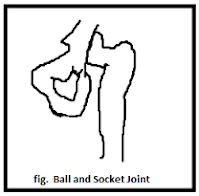NCERT Solutions for Class 6 Science Chapter 8 Body movements
NCERT solutions of class 6 science Chapter 8 Body movements is provided here with a set of some additional important question like Multiple choice questions and very short answer type questions. In this solutions all the questions are explained in simple words so that the students can understand it better without any difficulty.
TEXTUAL QUESTIONS
Question 1.
Fill in the blanks:
(a) Joints of the bones help in the ………. of
the body.
(b) A combination of bones and cartilages
forms the …….. of the body.
(c) The bones at the elbow are joined by a
………. Joint.
(d) The contraction of the ………. pulls the bones during movement.
Answer.
(a) Joints of the bones help in the movement of the body.
(b) A combination of bones and cartilages
forms the skeleton of the body.
(c) The bones at the elbow are joined by a hinge
Joint.
(d) The contraction of the muscles pulls the bones during
movement.
Question 2.
Indicate true (T) and false (F) among the
following sentences.
(a) The movement and locomotion of all animals
is exactly the same.
(b) The cartilages are harder than bones
(c) The finger bones do not have joints.
(d) The fore arm has two bones.
(e) Cockroaches have an outer skeleton.
(a) The movement and locomotion of all animals
is exactly the same. (F)
(b) The cartilages are harder than bones. (F)
(c) The finger bones do not have joints. (F)
(d) The fore arm has two bones. (T)
(e) Cockroaches have an outer skeleton. (T)
Question 3.
Match the items in Column I with one or more
items of Column II.
Question 4.
Answer the following:
(a) What is a ball and socket joint?
(b) Which of the skull bones are movable?
(e) Why can our elbow not move backward?
Answer.
(a) The rounded end of one bone fits into the hollow space of the other bone, such a kind of joint allows movement in all directions.
Example:- The Joint between upper arm and the shoulder.
(b) The lower jaw is movable.
(c) The elbow cannot move backward because it has hinge joint that only moves back and forth. Hinge is a device used in doors and windows. It does not allow backward motion. So elbow cannot move in backward direction.
Very Short Answer Type Questions
Question 1.
What is locomotion?
Answer.
The movement of body from one place to, another is called locomotion.
Question 2.
Which part of human body, can rotate in all directions?
Answer.
Arm, Leg.
Question 3.
Which parts of human body move in one
direction only?
Arm at elbow, Leg at knee, Finger inside.
Question 4.
What are bones?
The hardest part of the body is bone. It
provides shape to the body. There are many bones in every part of the body.
Question 5.
What is a joint?
The place where two or more bones meet
together is called joint.
Question 6.
Which parts of our body have a joint?
Elbow, Shoulder, Neck and Knee have a joint.
Question 7.
How many types of joints are found in a human body?
Answer.
Types of joints:-
(i) Ball and Socket Joint.
(ii) Hinge joint.
(iii) Immovable (fixed) joint.
(iv) Pivot joint..
Question 8.
Where is an immovable (a fixed) joint found ?
Answer.
Upper jaw.
Question 9.
What is skeleton?
The frame work of body is known as skeleton.
Question 10.
Which parts are protected by bone cage?
Bone cage protects lungs and hearts.
Short Answer Type Questions
Question 1.
Write about Ball and Socket joint.
Answer.
Ball and Socket joint. Ball and Socket joint
is found at shoulder and at hips. In this joint, round end of one bone fits
into the hollow space of another bone, thus allowing movement in all
directions.
Question 2.
What is pivotal joint ?
Answer.
The joint found in head and neck is pivotal
joint. This joint allows movement in
1. Up and down
2. To the sides and other directions also.
In this joint, a cylindrical bone rotates in a
ring.
Question 3.
Write a note on Hinge joint.
Answer.
Our knee and elbow have hinge joints. Hinge
joint is like a device used in doors and windows in which movement is in one
direction only. It allows only back and forth movement of the organ.
Question 4.
Explain in brief a fixed joint.
Answer.
Our head consists of such bones which are
joined together, but do not allow movement to the bones. These joints are
called fixed joints or immovable joints.
What is a skeleton ? What are its functions?
Answer.
The bony structure of our body is skeleton or
the frame work of bones is known as skeleton.
Function of skeleton :- It gives shape to body and allows movement to
various parts of the body.
NCERT Solutions for Class 6 Science – All Chapters
Chapter 2 Components of Food
Chapter 3 Fibre to Fabric
Chapter 4 Sorting Materials Into Groups
Chapter 5 Separation of Substances
Chapter 6 Changes Around Us
Chapter 7 Getting to Know Plants
Chapter 8 Body Movements
Chapter 9 The Living Organisms and Their Surroundings
Chapter 10 Motion and Measurement of Distances
Chapter 11 Light Shadows and Reflection
Chapter 12 Electricity and Circuits
Chapter 13 Fun with Magnets
Chapter 14 Water
Chapter 15 Air Around Us
Chapter 16 Garbage In Garbage Out.
%20(2)%20(1).webp)



Post a Comment